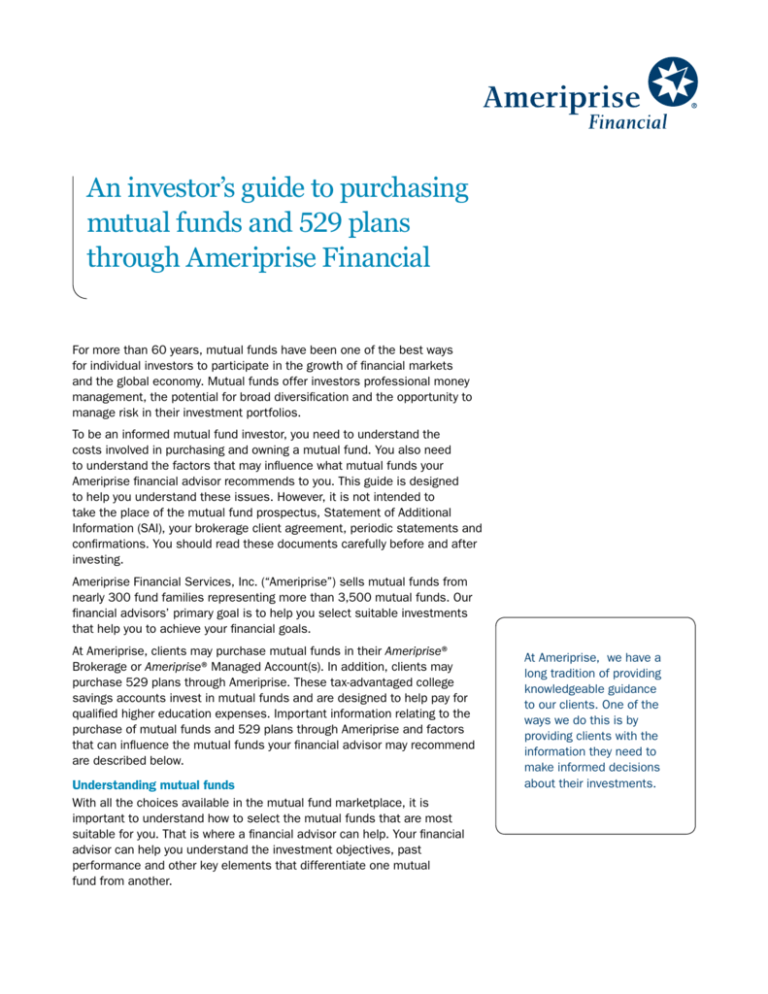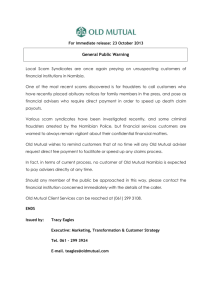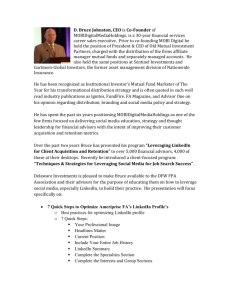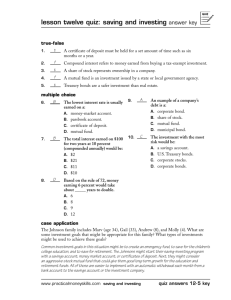
An investor’s guide to purchasing
mutual funds and 529 plans
through Ameriprise Financial
For more than 60 years, mutual funds have been one of the best ways
for individual investors to participate in the growth of financial markets
and the global economy. Mutual funds offer investors professional money
management, the potential for broad diversification and the opportunity to
manage risk in their investment portfolios.
To be an informed mutual fund investor, you need to understand the
costs involved in purchasing and owning a mutual fund. You also need
to understand the factors that may influence what mutual funds your
Ameriprise financial advisor recommends to you. This guide is designed
to help you understand these issues. However, it is not intended to
take the place of the mutual fund prospectus, Statement of Additional
Information (SAI), your brokerage client agreement, periodic statements and
confirmations. You should read these documents carefully before and after
investing.
Ameriprise Financial Services, Inc. (“Ameriprise”) sells mutual funds from
nearly 300 fund families representing more than 3,500 mutual funds. Our
financial advisors’ primary goal is to help you select suitable investments
that help you to achieve your financial goals.
At Ameriprise, clients may purchase mutual funds in their Ameriprise®
Brokerage or Ameriprise® Managed Account(s). In addition, clients may
purchase 529 plans through Ameriprise. These tax-advantaged college
savings accounts invest in mutual funds and are designed to help pay for
qualified higher education expenses. Important information relating to the
purchase of mutual funds and 529 plans through Ameriprise and factors
that can influence the mutual funds your financial advisor may recommend
are described below.
Understanding mutual funds
With all the choices available in the mutual fund marketplace, it is
important to understand how to select the mutual funds that are most
suitable for you. That is where a financial advisor can help. Your financial
advisor can help you understand the investment objectives, past
performance and other key elements that differentiate one mutual
fund from another.
At Ameriprise, we have a
long tradition of providing
knowledgeable guidance
to our clients. One of the
ways we do this is by
providing clients with the
information they need to
make informed decisions
about their investments.
All types of mutual funds share a few basic
characteristics that determine how you pay for them.
It is important to have a general understanding
of these characteristics. If you buy mutual funds
through Ameriprise, you should also understand how
your financial advisor and the firm are compensated,
and how that might influence your financial advisor’s
recommendations.
frequent trading/market timing and to administer small
account balances.
Ameriprise may impose charges for wire transfers or
other personal services you may request in connection
with your account.
Share classes
A mutual fund may offer more than one class of shares
to investors, the most common being Class A, B or C
shares. The different classes provide a choice of when
and how you pay for the services your financial advisor
and Ameriprise provide when recommending a mutual
fund investment. Regardless of share class, you hold
an investment in the same mutual fund.
Costs of investing in mutual funds
There are two primary costs associated with mutual
funds:
• Sales charges
• Operating expenses and other costs
There are important differences among share
classes including:
Sales charges. Sales charges (also called loads) are
commissions you may pay when you purchase or
sell mutual fund shares. Sales charges can be paid
in several ways depending on the “class” of mutual
fund shares you buy (see below for an explanation of
different share classes). Sales charges are designed
to compensate Ameriprise and Ameriprise financial
advisors for the support and assistance they provide
in helping you select appropriate mutual funds.
• S
ales charge and operating expenses you pay for
the share class
• When you pay those fees
• Commission your financial advisor receives
You should carefully review all sales charges and
operating expenses associated with any share class
you are considering for purchase.
Operating expenses and other costs. Operating
expenses are costs associated with operating a
mutual fund and are deducted from the value of a
mutual fund’s shares, rather than being paid directly
by the investor. This means that operating expenses
reduce the investment performance of a mutual fund.
Operating expenses typically vary from mutual fund to
mutual fund and by type of mutual fund (e.g., equity vs.
fixed income). Operating expenses generally differ for
each of a mutual fund’s share classes, thus accounting
for the variations in performance between different
share classes of the same mutual fund.
Class A shares. Class A shares typically have a “frontend” sales charge, meaning that the sales charge is
deducted from the amount you invest at the time of
your investment. Distribution (12b-1) fees are charged
as ongoing expenses and are generally lower for Class
A shares than for Class B or C shares. Generally, the
majority of the sales charge and the 12b-1 fees paid to
the firm are paid to your financial advisor.
Breakpoints. A mutual fund may offer discounts on
Class A share purchases, called breakpoints, that
reduce the front-end sales charge if the investor:
Operating expenses are required to be disclosed
whenever performance is shown and will also be
disclosed in the prospectus as a percentage of
a mutual fund’s assets. The total of the expense
categories described on page 3 is commonly referred
to as the “expense ratio” and can be used to compare
the expenses of mutual funds and share classes from
one mutual fund to another.
• Makes a large purchase; and/or
• A
lready holds other mutual funds offered by the
same fund family
• C
ommits to regularly purchasing the mutual
fund’s shares
The extent of the discount depends upon the size of
the purchase and typically begins at the $50,000 level,
but may start as low as $25,000. Generally, as the
amount of the purchase increases, the percentage
used to determine the sales load decreases. In fact,
the entire sales charge may be waived for investors
who make very large purchases ($500,000 or
$1,000,000) of Class A shares.
In addition, mutual fund share prices are affected
by portfolio transaction costs, including trading
commissions the mutual fund pays to brokers for
trading portfolio securities. The level of these costs
depends, in part, on the amount of trading the mutual
fund does and the types of securities the mutual fund
owns. Some mutual funds impose charges to prevent
2
Operating expenses
Management fees
These fees are paid
to the mutual fund’s
investment manager
for services such as:
research, portfolio
manager and trader
compensation,
technology and
related administrative
services.
Management fees are
the same for each
class of shares of a
mutual fund.
Distribution and
shareholder service
(12b-1) fees
The 12b-1 fee is
for sales-related
expenses including
marketing and
ongoing service
provided by the firm
and its financial
advisors. These fees
vary by share class.
Other expenses
These include fees
for: shareholder
recordkeeping,
portfolio accounting,
regulatory reporting,
audit, legal and
other non-investment
expenses necessary
to operate the mutual
fund.
The chart below illustrates typical breakpoint investment amounts and the
corresponding sales charges for the Columbia Threadneedle Investments
family of funds including Threadneedle Funds, excluding money market
funds.
Your investment amount
Your sales load
(as a % of the total investment)
(equity/bond funds)
Up to $49,999
$50,000 – $99,999
$100,000 – $249,999
$250,000 – $499,999
$500,000 – $999,999
$1,000,000 or more
5.75%/4.75%
4.75%/4.25%
3.50%
2.50%
2.00%
0.00%
Note: This is an illustration only, using the charges and breakpoint rules for the Columbia
Threadneedle Investments family of funds as disclosed in each fund’s prospectus. Consult the
prospectus for the specific fund in which you are investing for charges and breakpoint rules
applicable to your specific investment.
Rights of Accumulation (ROA). You may also qualify for breakpoint
discounts through Rights of Accumulation (ROA), which allow you to reach
a breakpoint by combining current and previous mutual fund purchases
in the same mutual fund or mutual fund family. ROA generally applies to
all shares you own in a mutual fund family, even if you purchase them
through different companies, within a systematic purchase or redemption
plan, or hold them in different types of accounts, such as an IRA. However,
depending upon the mutual fund family, certain shares purchased without
a front-end sales charge (e.g., shares held in 401(k) plans, fee-based
accounts or shares of money market funds) may not be included in
determining breakpoint eligibility.
ROA may also allow you to count purchases of mutual funds in the same
mutual fund family made by certain family members for the purpose of
determining breakpoint eligibility. This is referred to as a mutual fund
company’s householding rules.
Therefore, if you or your family members have accounts at other brokerdealers and you wish to take advantage of the balances in these accounts
to qualify for a breakpoint discount, including in some instances fee-based
accounts, you must inform your financial advisor about those balances.
You may need to provide documentation about the holdings at other firms
to your financial advisor if you wish to include those balances in your
ROA calculation.
You should also note that mutual funds often follow different rules to
determine the value of existing holdings. Some mutual funds use the
current net asset value (NAV) of existing investments in determining whether
an investor qualifies for a breakpoint discount. NAV of a stock is the price
at which one share was sold to the public as of the previous business day’s
market close. The NAV of a mutual fund is determined by adding the value
of all the securities in the fund’s portfolio, subtracting debts and expenses,
and dividing the result by the total number of shares outstanding.
3
A small number of funds use the “historical cost,”
which is the cost of the initial purchase, to determine
eligibility for breakpoint discounts. If the mutual fund
uses historical costs, you may need to provide account
records, such as confirmation statements or monthly
statements, to qualify for a breakpoint discount based
upon previous purchases. Consult with your financial
advisor and review the mutual fund’s prospectus to
determine whether the mutual fund uses either NAV or
historical costs to determine breakpoint eligibility.
determine whether your redemptions might be eligible
for a CDSC waiver.
Class C shares. Class C shares, in most cases, are
similar to Class B in that they have higher 12b-1
fees and impose a back-end rather than a front-end
sales charge. Also, like Class B, if there is no frontend sales charge, all of your dollars are invested at
the time of purchase. The back-end charge on Class
C shares is generally smaller than on Class B and is
typically eliminated after 12 months (rather than six to
10 years). However, Class C shares rarely convert to
Class A shares. This means the higher annual 12b-1
fees usually are in effect for as long as you own the
fund, which can make owning Class C shares more
costly over time. Generally, Class C shares are most
appropriate for short-term objectives (three to six
years at most). Like Class B shares, the annual 12b-1
fees for Class C shares cover the costs of advancing
commissions to financial advisors who are paid at the
time of sale.
Letter of Intent (LOI). By signing a Letter of Intent
(LOI), you agree to invest future amounts that would,
usually within the next 13 months, accumulate to a
breakpoint. You then receive a discount on all of those
purchases as if you were making all the investments
at once. If you fail to invest the full amount stated in
the LOI by the specified date, you will be charged the
higher load. Many mutual fund families allow purchases
made up to 90 days prior to the date that you sign the
LOI to count toward reaching the breakpoint.
No-load shares. “No-load” mutual funds do not have
sales charges so all of your dollars are invested
at the time of purchase. Operating expenses (i.e.,
management fees, 12b-1 fees and other expenses)
vary among funds. Expenses are typically lower for
no-load funds than for load funds, but be aware of
managerial or custodial fees. Talk with your financial
advisor, examine the fund’s prospectus or review the
Mutual Fund & ETF Expense Analyzer at the Financial
Industry Regulatory Authority (FINRA) website http://
apps.finra.org/fundanalyzer/1/fa.aspx to help you
determine the share class you may be eligible for and
want to purchase.
Discounts on sales charges vary from mutual fund
family to mutual fund family. As you consider investing
in one or more mutual funds from a given family of
mutual funds, be sure to discuss with your financial
advisor the discounts that may be available to you.
Class B shares. Class B shares typically have a “backend” sales charge, called a contingent deferred sales
charge (CDSC), and have no front-end sales charge.
You pay a sales charge on Class B shares when you
sell the shares, rather than when you buy them. This
sales charge declines over time until it is eliminated
and eventually the shares convert to Class A. This
usually occurs after you own the shares for a specified
period of time, ranging from six to 10 years.
Some mutual fund families offer load funds; others
offer no-load funds. If a fund family offers the same
fund in both load and no-load fund versions, Ameriprise
financial advisors are only authorized to sell the
load funds.
Since Class B shares do not impose a front-end
sales charge, all of your dollars are invested at the
time of purchase. However, your overall expenses,
as measured by the total expense ratio, can reduce
the return on your investment. Class B shares have
higher 12b-1 fees to cover the costs of “advancing”
commissions to financial advisors, who are paid at the
time of sale. Once Class B shares convert to Class A,
the lower Class A expense ratio applies to the shares.
Depending on the amount invested, your time horizon
and other factors, Class B shares may be more costly
over time than Class A shares.
Institutional share class. Ameriprise may offer
institutional share class funds. Institutional share
class funds are typically sold without a sales charge,
offer lower annual costs and management expenses
than Class A, B or C shares and do not impose 12b-1
fees. As a result of these lower costs and expenses,
institutional share classes generally require a much
higher investment minimum than other share classes.
Other classes of shares. While we have described
the most common mutual fund share classes above,
other classes of mutual funds shares and variations on
the share classes previously described are available
Some mutual fund families may waive the CDSC on
certain redemptions (such as redemptions following
the investor’s death or disability, or required minimum
distributions). Your financial advisor can help you
4
to shareholders, each with different fees, terms and expenses and thus,
different operating results and costs to investors. Not all share classes are
available through Ameriprise and you may not qualify for all share classes.
Read the prospectus and SAI for more information. Your financial advisor
can help you decide which purchase option is best for you.
To further assist you in your decision whether to buy Class A, B, C or noload shares, or any other share class offered, you should know that FINRA
offers a mutual fund expense analyzer on its website for comparing the
expenses of different fund classes. Using FINRA’s analyzer, with or without
your financial advisor, you can run actual comparisons of: (1) the amount
you plan to invest; (2) how long you plan to keep the mutual fund; and (3)
the mutual fund’s sales load and expenses per share class. The mutual
fund analyzer can be found at http://apps.finra.org/fundanalyzer/1/
fa.aspx.
Other ways to reduce mutual fund sales charges
In addition to taking advantage of breakpoints (described on page 2), there
are other ways to invest in mutual funds that offer the ability to reduce or
eliminate sales charges.
Exchanges. When you sell shares in a mutual fund and use the proceeds to
buy shares of another fund, you may be entitled to a reduction or complete
waiver of the sales charge on the new mutual fund. Ameriprise typically
offers this option only for funds in the same mutual fund family,
but there are circumstances in which another broker might offer this option
for funds in different families.
529 plan investments. If you are making purchases into 529 plans that
invest in mutual funds, you may be eligible for a waiver of the immediate
sales load if the new purchase is: (1) from a rollover of another 529 plan on
which you paid a sales charge; or (2) the redemption of another mutual fund
on which you previously paid a sales charge. In order to receive the waiver,
you must notify your financial advisor that you meet the conditions and
qualify for the waiver. If you fail to notify your financial advisor as required,
you will not receive the waiver. The mutual fund company may require that
you provide evidence that you qualify for the waiver.
No-load options. If you purchase a no-load fund, there will be no sales
charge and typically the expenses are considerably lower than for load
funds. You may be assessed a transaction fee at the time of purchase
or sale to cover the cost of offering the mutual fund to you. No-load funds
and no-load classes of shares are not available through our financial
advisors but may be available online through the Ameriprise Brokerage
Platform, through other brokers and directly from mutual fund companies.
Understanding the availability of breakpoint discounts and load waivers
is important because it may enable you to purchase Class A shares at
a lower price or otherwise affect your decision regarding the appropriate
share class in which to invest. You should discuss the availability of
breakpoint discounts with your financial advisor and carefully review the
mutual fund prospectus and its SAI, which your financial advisor can
provide, when choosing among the share classes offered by a mutual fund.
If you wish to learn more about mutual fund share classes or mutual fund
breakpoints, review the investor alerts available on the FINRA website.
5
Fee-based accounts
In fee-based accounts
(sometimes called
“wrap programs”),
mutual funds typically
are purchased as
load-waived shares
(no-load funds may
also be available).
Instead of paying
a sales charge on
each purchase, you
pay an annual fee
based on the value
of the assets in the
fee-based account.
As part of the mutual
fund’s operating
expenses, you still pay
12b-1 fees and
other ongoing
expenses, just as
you would if you
purchased the mutual
fund outside of a
fee-based account.
The length of time
you intend to hold
the investment and
the amount you
intend to invest are
important factors in
determining whether
it is to your advantage
to purchase shares
in a wrap program.
Before selecting this
option, you should
consider all other
factors, features and
benefits of fee-based
accounts. Ameriprise
offers its clients
several fee-based
account options.
For more information, see http://www.finra.org/
InvestorInformation/InvestorAlerts/MutualFunds/
UnderstandingMutualFundClasses/p006022,
http://www.finra.org/Investors/ProtectYourself/
InvestorAlerts/MutualFunds/P005964 and
http://www.finra.org/Investors/ProtectYourself/
InvestorAlerts/MutualFunds/P006008 or visit the
many mutual fund websites available to the public.
Financial advisors may offer, and clients are free to
choose, mutual funds from nearly 300 mutual fund
firms. However, certain aspects of the Mutual Fund
Program (“Program”) may create a conflict of interest
or incentive if Ameriprise promotes, or financial
advisors recommend, the mutual funds offered by
a firm participating in the Program vs. mutual funds
offered by nonparticipating firms. In addition, among
firms participating in the Program, financial advisors
generally have a greater incentive to offer mutual funds
from Full Participation firms than mutual funds from
Limited Participation firms. As further described below,
these conflicts and incentives may arise from the
marketing and sales support provided to our financial
advisors by, as well as the payments Ameriprise
receives from, firms participating in the Program,
and with other relationships with firms, including
our affiliation with Columbia Threadneedle and the
Columbia-branded mutual funds, in addition to other
fund brands (the “Affiliated Columbia Funds”) – see the
section titled “Affiliated mutual funds” on page 9.
Purchasing mutual funds and 529 plans through
Ameriprise
Ameriprise has agreements with nearly 300 mutual
fund firms, which allows us to offer clients a broad
range of more than 3,500 mutual funds. The financial
advisor’s goal is to select suitable investments that
help clients achieve their financial goals. The following
sections describe important information relating to the
availability of mutual funds offered through Ameriprise
and factors that may influence the mutual funds
financial advisors recommend.
Payments from product companies
Ameriprise receives a variety of payments for selling
the products of proprietary and non-proprietary
product companies. These include payments for
marketing support, recordkeeping and other client
account services, startup costs, technology and related
expenses, conferences and client events. The most
significant payments are marketing support payments.
Marketing and sales support
The firms in the Program that are Full Participation
firms provide education, training, marketing and
sales support to financial advisors. These firms may
reimburse Ameriprise or financial advisors for client/
prospect education events and financial advisor sales
meetings, seminars and training events consistent
with Ameriprise policies; Ameriprise Financial Services
may also receive nominal non-cash benefits from time
to time. Limited Participation firms pay marketing
support at a lower level than Full Participation firms;
therefore, Limited Participation firms may not provide
some services, or the same level of services, to
financial advisors. As a result, financial advisors may
have a greater familiarity with Full Participation firms
and an incentive to sell funds and 529 plans of Full
Participation firms.
Mutual fund and 529 plan marketing support payments
Mutual fund and 529 plan marketing and sales support
payments are received from certain mutual fund firms
(described below as “Full” and “Limited” Participation
firms) within the nearly 300 mutual fund firms (“firms”)
Ameriprise offers.
The goal at Ameriprise is to offer a wide range of
mutual funds using the following criteria:
• M
arketing payments to support the cost
of distribution
Marketing support payments
To be included in the Program, firms have agreed to
pay Ameriprise a portion of the revenue generated
from the sale and/or management of mutual fund
shares. Full Participation firms pay marketing support
at a higher level than Limited Participation firms. Each
year a client holds shares of a particular mutual fund,
the mutual fund’s financial advisor or distributor may
pay to Ameriprise an amount based on the value
of the collective mutual fund shares held in clients’
accounts (asset-based payment). In addition, a mutual
fund’s financial advisor or distributor may pay a fee
• Financial strength of the firm
• Product breadth and strong performing funds
• A
bility to provide wholesaling and training to
our financial advisors
• T ax benefits offered by individual states
(specific to 529 plans)
• O
verall quality of the 529 plan
(specific to 529 plans)
6
to Ameriprise for the mutual fund shares purchased
during a given period (sales-based payment). As of
December 2014, Ameriprise received an asset-based
payment (up to 0.25% per year for mutual funds and
0.16% per year for 529 plans) on some or all of clients’
assets managed by the participating firms and a salesbased payment (up to 0.25% for mutual funds and
0.20% for 529 plans) on some or all of the participating
firms’ gross sales made through Ameriprise.
Investments. Each of these firms is referred to as a
Full Participation firm.
Limited Participation firms
Three firms participate in the Program at a limited
level. These firms include: AB, Franklin Templeton
Investments and PIMCO Investments. These firms are
Limited Participation firms.
529 plan Limited Participation firms include: AB and
Franklin Templeton Investments..
Limited Participation firms generally limit by prospectus
the amount of marketing support their affiliates may
pay on mutual funds.
Mutual Fund List
Ameriprise financial advisors may make mutual
fund recommendations based on a group of funds
that appear on an Ameriprise Financial Services
mutual fund list (the “List”). The List is developed
by the Ameriprise Investment Research Group (IRG).
Approximately 1,600 mutual funds are eligible for
inclusion on the List, which includes only mutual funds
from Full Participation Firms in the Ameriprise Financial
Services Mutual Fund Program described above.
Ameriprise receives up to 0.62% of money fund
deposits for its money market fund sweep program.
The amount that Ameriprise receives may be reduced
based on fee waivers that are imposed by the money
market fund firm.
Specific marketing support payments are detailed in
this guide (beginning on page 9). These arrangements
vary between firms and may be subject to change
or renegotiation at any time. If a firm ceases to pay
marketing support or other fees, Ameriprise may
remove the firm from the Program and may
cease to offer that firm’s mutual fund shares and/or
529 plan(s).
In developing the List, the IRG applies a quantitative
and qualitative evaluation process that includes an
analysis of a fund’s returns, risk and expenses; the
tenure of its portfolio managers; and the consistency
of its performance and style. Certain mutual funds that
would have otherwise been included on the List were
excluded due to their high investment minimums. Client
suitability must be considered when trading mutual
funds, including breakpoint discount eligibility and NAV
transfer availability. The funds on the List are subject
to change periodically; however, changes to the List
should not be the sole reason to prompt trading.
Full Participation firms
As of Aug. 1, 2015, twenty-nine firms fully participate
in the Program. These firms include: Allianz Global
Investors, American Century Investments, BlackRock
Funds, Calvert Investments, Columbia Threadneedle
Investments, Delaware Investments, Deutsche
Asset & Wealth Management, Dreyfus, Eaton Vance,
Federated, Fidelity Investments, Goldman Sachs &
Co., Invesco, Ivy Funds, Janus Capital Group, John
Hancock Investments, JP Morgan Asset Management,
Legg Mason, Lord Abbett, MainStay Investments, MFS
Investment Management, Neuberger Berman, Nuveen
Investments, OppenheimerFunds, Principal Funds,
Prudential Investments, Putnam Investments, Virtus
Investment Partners and Wells Fargo Advantage Funds.
These firms are referred to as “Full Participation firms.”
This List is developed by evaluating the characteristics
of each fund’s A share class. As a result, clients for
whom another share class may be more advantageous
may be unable to purchase a fund on the List if that
fund does not offer that particular share class. In
addition, the List was developed using those funds
currently available through SPS Advantage, SPS Advisor
or the Ameriprise Brokerage Platform. As a result,
clients may not be able to purchase a fund on the List
if that fund is not available through the service in which
the client invests.
We offer 529 plans from 23 firms. Of those 23 firms,
14 are Full Participation firms. These fund firms
include: Allianz Global Investors, American Century
Investments, BlackRock Funds, Calvert Investments,
Columbia Threadneedle Investments, Deutsche
Asset & Wealth Management, Fidelity Investments,
Ivy Funds, JP Morgan Asset Management, John
Hancock Investments, Legg Mason, MFS Investment
Management, OppenheimerFunds and Putnam
Ameriprise Financial Services receives payments for
the services we provide to the Full Participation firms
(including Columbia Threadneedle Investments) and to
other funds available for sale at Ameriprise Financial
Services. The amount of fees Ameriprise Financial
Services receives from funds eligible for inclusion on
the List is not considered in the selection process
7
for inclusion on the List, and no fund pays Ameriprise
Financial Services to be on the List. Clients may
choose to follow the recommendations provided by the
Ameriprise financial advisor or may select from any of
the other funds offered through Ameriprise Financial
Services, regardless of whether that fund appears on
the List.
for operational support. In addition, some mutual fund
firms may pay Ameriprise to participate in a conference
or may reimburse permitted expenses of Ameriprise
financial advisors. Information about these charges
and fees may be viewed in this guide or in the mutual
fund prospectus. Ameriprise receives up to 0.40%
per year on some, or all, of Ameriprise clients’ assets
managed by participating mutual fund firms.
Distribution support relationships
Ameriprise also has arrangements with firms for
distribution support services. These firms make
payments of up to 0.18% on sales and 0.10% on
assets to Ameriprise for these services, which support
the distribution of the fund’s shares and 529 plans
by making them available on one or more Ameriprise
platforms, commonly known as “shelf space.” These
mutual fund firms do not provide marketing and sales
support to financial advisors and do not participate in
the Mutual Fund List (as described in the next section).
Ameriprise provides clients with access to other firms
through its relationship with Charles Schwab & Co.,
Inc. (“Schwab”) and Schwab’s mutual fund program.
Schwab passes to Ameriprise certain payments it
receives from firms accessed through its program.
American Enterprise Investment Services, Inc., an
affiliate of Ameriprise Financial and its clearing firm,
receives payments from some firms for client and other
account services. American Enterprise Investment
Services, Inc. shares a portion of that fee with
Ameriprise for providing distribution support services,
which is sometimes referred to as shareholder support
services.
Ameriprise sells 529 plans from three firms that
neither have wholesaling access to Ameriprise financial
advisors nor pay marketing or distribution support.
Moreover, the plans are available for sale primarily to
in-state residents. These firms are: American Funds,
First National Bank of Omaha and Union Bank &
Trust. Certain 529 plans may pay Ameriprise financial
advisors a fee of up to 1% of assets for NAV rollovers.
Ameriprise Financial, Inc. and its affiliates may have
other relationships with firms whose mutual funds
Ameriprise offers. For example, these firms or their
affiliates may act as subadviser to an Ameripriseaffiliated asset manager or vice versa. These firms or
their affiliates may manage an investment portfolio
within an Ameriprise or affiliated product, such as
a RiverSource(R) variable annuity, or they may use
products managed by an Ameriprise affiliate (including
Columbia Threadneedle Investments) as underlying
investment options in their own products.
The total amount received from all distribution support
firms in 2014 was $11,679,767. The firms that paid
more than $500,000 were:
• First Eagle Funds ($2,407,400)
• AMG Funds ($933,070)
Ameriprise has marketing support agreements with
BlackRock Advisors, LLC and Fidelity Investments,
with respect to mutual fund positions held by
Ameriprise Financial customers. BlackRock, Inc. and
Fidelity Investments each own more than 5% of the
outstanding shares of Ameriprise Financial, Inc. stock.
• Natixis Global Asset Management ($828,085)
• Gabelli Funds ($617,047)
• THORNBURG Funds ($571,926)
• Principal Funds ($538,424)
• Neuberger Berman Funds ($533,251)
Transaction charges
Ameriprise financial advisors pay charges on mutual
fund sales, purchases and exchanges (“transaction
charges”). Transaction charges are determined using
a variety of factors such as: the type of transaction,
processing methodology (e.g., online, telephone,
systematic arrangements), account type (fee-based
SPS Advantage account/transaction-based brokerage
account), and, in one case, the firm. Financial advisors
pay the same mutual fund transaction rate for all
mutual fund firms except American Funds. Financial
advisors pay significantly higher transaction charges
The remaining firms paid amounts ranging from $6 to
$363,822.
Other financial relationships
In addition to sales charges, 12b-1 fees and marketing
support payments Ameriprise receives, the mutual
fund’s financial advisor, distributor or affiliate may also
make other payments to Ameriprise for client services
and other account maintenance activities provided.
All of the mutual funds sold by Ameriprise pay
Ameriprise networking and/or omnibus services fees
8
(up to $85 per transaction) on mutual fund purchases
of American Funds. This higher transaction charge may
be a disincentive for financial advisors to recommend
American Funds. Additionally, American Funds does not
pay Ameriprise Financial Services for either marketing
support or distribution support.
Affiliated mutual funds
Mutual funds marketed under the brand Columbia
Threadneedle Investments, including Columbia,
Wanger, Columbia Acorn, and Threadneedle funds, are
affiliated with Ameriprise Financial, Inc.
The affiliates of Ameriprise provide certain
administrative, and transfer agent services to these
Summaries of 2014 mutual fund firms’ marketing support follow,
segmented by mutual fund or 529 plan products
Mutual fund marketing support arrangements by fund firm (Jan. 1, 2014 to Dec. 31, 2014)
Fund firm
Marketing support
payments from fund firms
in 20141
Source of payment
AllianceBernstein
$685,772
AllianceBernstein Investment Research and Management, Inc.
ALLIANZ
$1,382,035
Allianz Global Investors Distributors, LLC
American Century
$5,178,788
American Century Investment Services, Inc.
Blackrock
$12,442,912
BlackRock Advisors, LLC
Calvert
$2,056,207
Calvert Distributors, Inc.
Columbia
$57,153,213
Columbia Management Distributors, Inc.
Delaware
$1,133,817
Delaware Investments
Deutsche
$5,159,152
DeAWM Distributors, Inc.
Dreyfus
$3,703,322
The Dreyfus Corporation and/or Dreyfus Service Corporation
Eaton Vance
$6,366,754
Eaton Vance Distributors, Inc.
Federated Investors
$2,900,938
Federated Securities Corp.
Fidelity Investments
$11,291,606
Fidelity Distributors Corporation
Franklin Templeton
$5,255,603
Franklin Templeton Distributors, Inc.
Goldman Sachs
$7,145,471
Goldman, Sachs & Co.
Invesco
$10,239,141
Invesco Aim Distributors, Inc.
IVY Funds
$6,450,609
Ivy Funds Distributor, Inc.
Janus Advisor
$2,882,717
Janus Capital Management, LLC
John Hancock
$9,405,536
John Hancock Funds, LLC
JP Morgan
$9,642,573
J.P. Morgan Distribution Services, Inc.
Legg Mason
$5,315,501
Legg Mason & Co., LLC
Lord Abbett
$1,443,286
Lord Abbett Distributor LLC
Mainstay
$882,972
New York Life Investment Management, LLC
MFS
$21,005,789
MFS Fund Distributors, Inc.
Nuveen
$2,278,780
Nuveen Investments
Oppenheimer
$14,830,980
Oppenheimer Funds Distributor, Inc.
PIMCO
$1,959,683
PIMCO Investments, LLC
Prudential
$6,835,470
Prudential Investments, LLC
Putnam
$4,632,702
Putnam Retail Management Limited Partnership
2
9
Fund firm
Marketing support
payments from fund firms
in 20141
Source of payment
Virtus
$5,629,647
Virtus Investment Partners, Inc.
Wells Fargo
$14,356,087
Wells Fargo Funds Distributor, LLC
Total Marketing Support
Payments from Mutual Fund
Firms in 20141:
$239,647,064
1
“Total Marketing Support Payments” represents the amount recognized as revenue by Ameriprise Financial Services, Inc. for the billing
period from Jan. 1, 2014 through Dec. 31, 2014 on retail mutual fund sales and assets. These figures also include amounts pertaining to
firms’ participation in Ameriprise-organized conferences.
2
Mainstay was added to the program from a Distribution Support relationship on July 1, 2014.
529 plan marketing support arrangements by fund firms (Jan. 1, 2014 to Dec. 31, 2014)
Summaries of 2014 mutual fund firms’ marketing support follow, segmented by mutual fund or 529 plan products:
Fund firm
Marketing support payments
Source of payment
from fund firms in 20144
AllianceBernstein
$51,342
AllianceBernstein Investment Research and Management, Inc.
ALLIANZ
$7,294
Allianz Global Investors Distributors, LLC
American Century
$92,676
American Century Investment Services, Inc.
Blackrock4
$50,000
BlackRock Advisors, LLC
Calvert
$3,086
Calvert Distributors, Inc.
Columbia
$163,449
Columbia Management Distributors, Inc.
Fidelity Investments
$873,566
Fidelity Distributors Corporation
Franklin Templeton
$28,622
Franklin Templeton Distributors, Inc.
Hartford
$21,022
Hartford Securities Distribution Co. Inc.
IVY Funds
$5,162
Ivy Funds Distributor, Inc.
John Hancock
$328,638
John Hancock Funds, LLC
JP Morgan
$296,583
J.P. Morgan Distribution Services, Inc.
Legg Mason4
$45,000
Legg Mason & Co., LLC
MFS
$119,154
MFS Fund Distributors, Inc.
Oppenheimer
$264,596
Oppenheimer Funds Distributor, Inc.
Putnam
$29,232
Putnam Retail Management Limited Partnership
Voya
$389,028
Voya Investment Distributors, LLC
Total Marketing Support
Payments from 529 Plan
Firms in 20143:
$2,768,450
3
“Total Marketing Support Payments” represent amounts recognized as revenue by Ameriprise Financial Services, Inc. for the billing period
from Jan. 1, 2014 through Dec. 31, 2014 on 529 Plan assets. These figures also include amounts pertaining to firms’ participation in
Ameriprise-organized conferences.
4
BlackRock and Legg Mason paid a flat fee amount in lieu of sales- or asset-based marketing support.
10
mutual funds. Ameriprise and its affiliates generally receive more revenue
from sales of affiliated mutual funds than from sales of other mutual
funds. Employee compensation and operating goals at all levels of the
company are tied to the company’s success. Certain employees may
receive higher compensation and other benefits based, in part, on assets
invested in affiliated mutual funds.
Financial planning tools
Ameriprise has developed a variety of tools and resources to help its
financial advisors make recommendations and serve you better. Some,
but not all, financial planning software tools available for use by your
financial advisor were developed by Ameriprise or unaffiliated third-parties
and may make it more convenient for your financial advisor to select
proprietary products.
Compensation for the firm and its financial advisors
Both Ameriprise and your individual Ameriprise financial advisor are
compensated when you buy a mutual fund through Ameriprise. Generally,
your financial advisor receives a substantial portion of the sales charge
and 12b-1 fees paid to the firm in connection with your purchase for as
long as you own your fund shares. Sales charges and 12b-1 fees vary
from mutual fund to mutual fund and from share class to share class.
Ameriprise and the financial advisor receive more compensation on fund
or share classes that pay higher fees.
Ameriprise and the financial advisor generally receive less compensation
when the sales charge and/or 12b-1 fee is reduced, waived completely
or where there is no sales charge. Therefore, there is an incentive for
Ameriprise financial advisors to sell a fund from a load fund family or a
fund that pays a 12b-1 fee over one that does not.
Ameriprise receives more revenue from the sale of some mutual funds,
particularly mutual funds sold under Columbia Threadneedle Investments
or other affiliated brands, than for the sale of other mutual funds.
Ameriprise generally also receives more revenue for mutual funds sold in
a fee-based account than for those sold with only a sales charge. Higher
revenue generally results in greater profitability for the firm. Employee
compensation (including management and field leader compensation)
and operating goals at all levels of the company are tied to the company’s
success. Management, sales leaders and other employees generally
spend more of their time and resources promoting Ameriprise products
and services, such as Columbia Threadneedle Investments and
RiverSource® products and services.
Ameriprise also offers financial planning services for a fee. The resulting
written financial plan may recommend financial products and services
that the client may purchase through Ameriprise, although the client
is not obligated to do so. The advice is portable and can be used
11
Disclosure for
persons without a
financial advisor
Mutual funds can be
purchased through
Ameriprise without
the aid of a financial
advisor through the
company’s online
brokerage site or other
channels. If you do not
work with a financial
advisor, some of the
statements in this
document may not
apply to you. If you
do not work with a
financial advisor,
Ameriprise keeps
the full amount of
any sales charges
and 12b-1 fees paid
to Ameriprise in
connection with your
transaction.
elsewhere. The fees paid for financial planning services
are separate from, and in addition to, fees paid for
any financial products purchased through Ameriprise.
For further information on financial advisory services,
ask your financial advisor for the Ameriprise Financial
Form ADV Part II Disclosure Brochure for the services
purchased.
For more information
Additional detailed information on mutual fund fees,
expenses and other important information is available
in the mutual fund’s prospectus, SAI and annual
report. For general information on mutual funds,
you may visit educational websites of the Securities
and Exchange Commission (sec.gov), the Financial
Industry Regulatory Authority (finra.org), the Securities
Industry Association (siaonline.org) and the Investment
Company Institute (ici.org).
Your Ameriprise financial advisor can provide you with
additional information and help you better understand
the topics covered in this document. You can also call
1.800.862.7919 with your questions.
Financial Planning | Retirement | Investments | Insurance
Ameriprise Financial Services, Inc.
70100 Ameriprise Financial Center Minneapolis, MN 55474
ameriprise.com
Ameriprise Financial, Inc. and its affiliates do not offer tax or legal advice. Consumers should consult with their tax advisor or attorney
regarding their specific situation.
Clients should consider the investment objectives, risks, charges and expenses of a mutual fund carefully before investing. The prospectus
contains this and other important information about the funds and should be read carefully before investing.
Clients should carefully consider the investment objectives, risks, charges and expenses associated with a 529 plan before investing. More
information regarding a particular 529 plan is available in the issuer’s official statement, which may be obtained from an Ameriprise financial
advisor. Investors should read the 529 plan’s official statement carefully before investing.
Clients contributing to a 529 plan offered by a state in which they are not a resident should consider before investing whether their, or their
designated beneficiary(s) home state offers any state tax or other benefits only available for investments in such state’s qualified tuition
program.
Investment products, including shares of mutual funds, are not federally or FDIC-insured, are not deposits or obligations of, or guaranteed
by any financial institution, and involve investment risks including possible loss of principal and fluctuation in value.
Ameriprise Financial Services, Inc. Member FINRA and SIPC.
© 2010–2015 Ameriprise Financial, Inc. All rights reserved.
200757 Q (8/15)







